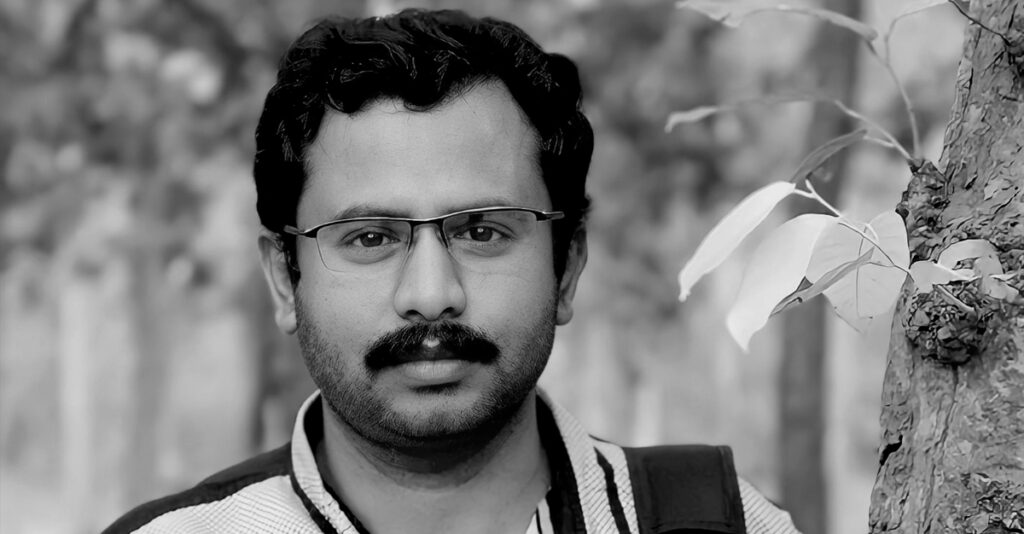Kushal Dutta

Eliot once said in the context of why does a poet compose poems – “The poets… they were, at best, engaged in the task of trying to find the verbal equivalent for states of mind and feeling.”* This is certainly an important reply to the question – why does poet write? But is it just one reason that a poet composes a poem?
With the right of a practitioner of poetry, why do I write poetry – the ‘I’ of this question can be changed to ‘we’. It can be changed away from poetry to other genres, in terms of why we write literature as a whole. By this time the literature of our language or scores of writers known and unknown, from many corners of the world practicing literature in a myriad of languages, have made their effort to frame a proper reply to the question as to why one writes from their own varied viewpoints. One can discover in this journey seeking for the truth that, the way poetry can never be confined in a simple definition – the delving for truth for literature ‘why I write’ is observed to be generally varying from different angles. The reason – the truth of literature is not a constant like 2 + 2 = 4 in science or mathematics. Though on some rare occasions they appear to be true, often the result of 2 + 2 is 3 or 2, 1 or 0 or even may be 5, 6, 7 etc.
The truth of literature – in another sense, the perception of literature by different writers or readers varies widely, the response to the query why a litterateur writes also appears to be different with different authors. As a reason for being different, apart from the transformation – evolution (temporal) of the mental world of the writer, the endemic reality (spatial) also effects as the major grounds. The way the fingerprints of each of us is unique, the explanation of the question why one writes is observed to vary and unique as the writer does. Because – Many men many minds. On the other hand, the same mind may have different expressions depending on different contexts, different perspectives. It is presumed that, amongst these varying angle of visions, the most important cause is psycho-philosophical and socio-linguistic. Though yours truly do not wish to brag oneself as a writer yet in a humble effort to douse the curiosity though to a little extent, have tried on several occasions through various angles on ‘why one writes’, so those are not to be repeated here. Along with those earlier explanations, one popular commentary have struck my mind. That is the immense wealth and possibilities lying hidden in the sense and significance that has got enlivened in the use of language. A direct example can be drawn from an expression of my favorite poet Hemanga Kumar Dutta:
"The night cannot gift you with the Sun
But a poem can"
Poetry, for me, is the Kalpavriksha (the wish-fulfilling divine tree). It is nothing else – imagination of complete attainment, that is collective, the entire entity (macro). On the other hand, as an imaginator of Kalpavriksha, yours truly is an individual (micro), tiniest speck of dust of our Lakshminath Bezbaroa, Carl Sagan’s ‘Pale Blue Dot’.
This poet made a humble effort to sketch a comparative picture in word form of the eon old question ‘Why a poet writes’, thus:
POETRY
Once she narrated a story
of a Kalpavriksha
with metaphors
Before one could choose between
Fetters or convention
Like peeling off pseudostem of plantains
Removing the veils one by one
It emerged – the tree was none else
Then herself
On another day
It was observed
The leaves of the tree
Intending to produce
an inexhaustible number of fruits
have been nibbled up to nought
by a handful of
metaphors, similes and allegories
Once more
on digging up the mantle of the Earth
to decipher
I noticed
It is not too far now for the Spring
In the times of the never-ending winter
Was she too thinking just of the apical buds
In the forest of the fallen leaves
or had she been busy
In unearthing
Just another story
The stories appeared like
Transitory arrangement
Disarray of a word puzzle
Till it is deciphered
Metaphors, similes and allegories
Everything
Thereafter
Through another roundabout
Yet again another new voyage
Across the periphery of the house garden
Spread to the foothills
Right from the riverbank
picking up the imageries of
unknown-unseen-unheard-incomparable
along the thick bushy jungle
She is a faceful-sunshine
Drenched in the dew
Enduring even the scratches of thorny grasses
Through the fallen leaves
branches and twigs
to the apical buds
Engrossed in the making of
Metaphoric scripts of dew-blood
My Brikshakalpa
But I know, the way the experience and role of every poet in the context of space and time as an ‘individual’ is partial, this explanation of ours in poetic form is also a partial explanation.
……………….
Note: Review of Metaphysical Lyrics and Poems of the Seventeenth Century: Donne to Butler (Article), 1921.
Translated by Bibekananda Choudhury
Kushal Dutta is an Assamese poet and journalist based in Guwahati, Assam. He has published seven collections of poems. Alop Absurd is his latest collection of poems.
Bibekananda Choudhry is a writer and translator based in Guwahati, Assam.